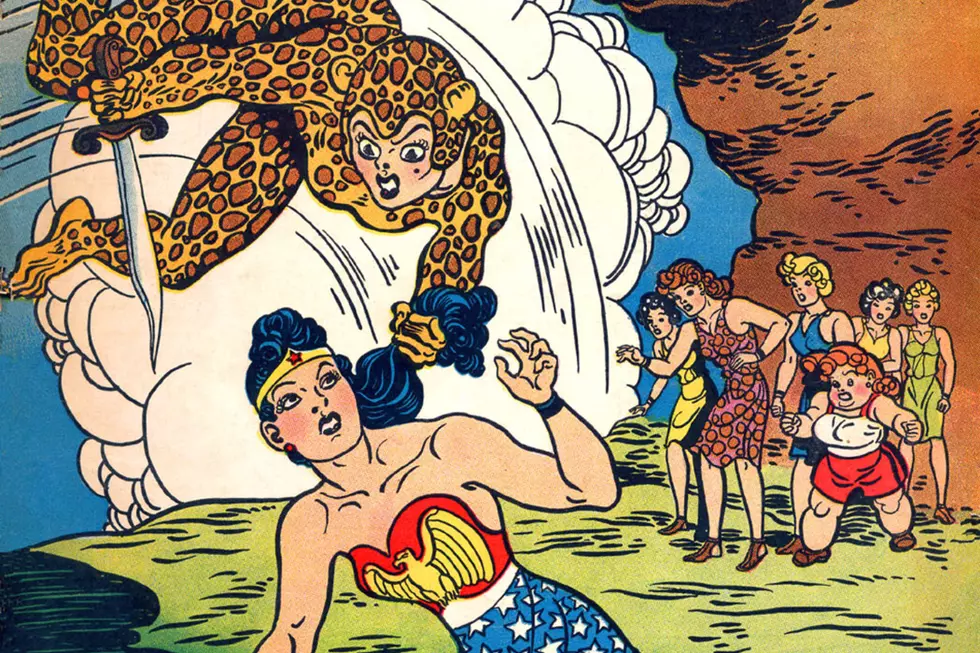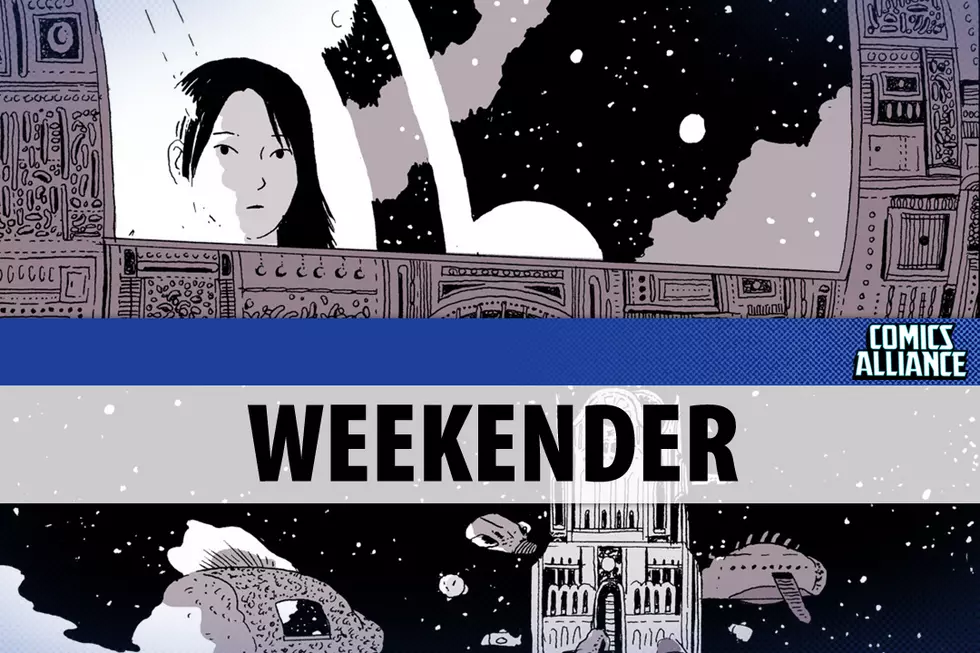
Ask Chris #208: Worlds Will Live, Worlds Will Die, And ‘Crisis On Infinite Earths’ Is Basically A Mess
Q: I was reading your column about New Teen Titans where you said Crisis on Infinite Earths was a mess, but a topic for another time. Care to explain now? -- @jeremyliveshere
A: The one thing you can't say about Crisis on Infinite Earths is that it didn't deliver on its promise. In a time when "event" comics were still in their infancy, Crisis came out of the gate promising to be the biggest thing that had ever or would ever hit comics, and looking back on it from almost thirty years later, it's hard not to admit that even with a comic rolling out every six months like clockwork that promises to change everything forever, it's still the one that actually did it. Worlds did live, worlds did die, and nothing actually was the same again.
It just also happens to be a story that's a complete friggin' mess.
The first big problem with Crisis, from a storytelling standpoint at least, is that it's inherently reactive. I've written about this before, but the motivation for the entire project seems to be rooted in the idea of DC's desire to compete with Marvel on Marvel's terms. While the official line is that DC's multiverse had become needlessly complex and was in dire need of streamlining, the real motivation -- at least the way I see it -- was that the multiverse tied DC to its past in a way that felt old-fashioned, conjuring up images of "imaginary stories" and characters that DC acquired when they bought out Golden Age competitors and shuttled off to their own universes. Marvel, on the other hand, felt contemporary, even though it had been around for over 20 years by that point, and when you stack them up against each other, there's one difference that sticks out above anything else: Marvel feels unified.
Obviously, that has a lot less to do with the idea of a multiverse, something that Marvel was, despite popular opinion, steadily building up themselves in the pages of What If and laying the groundwork for plenty of alternate universe stories about vampire Storm and Spider-Girl in the years to come. Heck, at the time, one of their most creatively and critically successful stories ever, Days of Future Past, which propelled the X-Men to massive heights, is the prime example of an alternate universe story that just won't go away. Think about how many times you've seen Wolverine with grey temples show up in various places, and tell me the House of Ideas doesn't have a Multiverse.
The real reason for that feeling of unity was, of course, that about 75% of that universe was created by a single creative team, Stan Lee and Jack Kirby, and that a good chunk of that other 25% had Lee involved as writer, co-creator, editor or all of the above. DC had been assembled out of the mad rush of the Golden Age, patched together by editors wrangling kids who had no idea what they were doing (especially when it came to signing contracts), and even once it was all put together on Earth-1, it was still fragmented, with the heroes all existing in their own little parallel universes that just happened to be called "Gotham City" or "Metropolis."
So already, from before the first moment of Crisis, it's trying to play catch-up. It's this weird admission that the DC Universe sucks, which presents kind of a problem when the major selling point is the fate of the DC Universe, which means their target audience was a bunch of people who actually cared about the DC Universe. Seriously, if you're going to be emotionally affected by Crisis, then it's probably because you've put the time in somehow figuring out how to care about Barry Allen.
And given the Flash stories that came out right before Crisis, that takes a heck of a lot of effort.
The thing is, that's also Crisis's greatest strength. Since they were scrapping the entire universe, it's the first time in comics history that EVERYTHING was in danger. I mean, they killed the Flash! They killed Supergirl! I mean, depending on how metaphorical you want to get with your definitions, they even killed Superman, Batman and Wonder Woman! The ones we get after Crisis -- especially Superman -- certainly aren't the ones we had before, and Wonder Woman doesn't even have her own comic for like two years after. They destroyed their entire universe, and these were changes that were actually intended to be permanent! My pal Scott, who's been quoted several times in those Here's The Thing videos, was fond of saying that there's nowhere to go after that, because nothing can ever have stakes that high again. According to him, the only way to top Crisis would be to actually put the readers themselves in danger, and the technology's just not there.
Yet.
One of the amazing things about that is that they did it with the main line DC characters. The Superman in Crisis is the "real" Superman, who fights for his own existence and, if you really want to get down to it, loses. Crisis has a nominally happy ending, but nothing is the same after. Those characters and the world they live in are gone. Compare that to DC's most recent attempt at chucking the baby and the bathwater through the nearest available window, Flashpoint. Nothing in that comic really feels like it's at risk, because it's all happening to these weird alternate universe characters that ultimately don't matter. They're just a bunch of grotesque caricatures meant to serve some purpose that I still don't understand three years later, and there's no connection. To them. Oh no, alternate universe Aquaman and alternate universe Wonder Woman don't like each other! I sure hope this doesn't cause any hilariously gore-splattered violence that will change the fate of a universe that in six months will only exist in the form of heavily discounted toys marketed to tiny little babies!
Crisis, because of why it was created, puts everything on the table and delivers on its threats. But because of that, because it was done to serve that purpose, it ends up being built really awkwardly as a story.
The short version is that it's housekeeping disguised as a story, and that what story there is story plays a distant second fiddle all the gymnastics that it's doing trying to rebuild continuity. Crisis was the book that codified that complex continuity was what was keeping out readers while reveling in it at the same time, ending up producing a story that doesn't actually make a whole lot of sense. If you go back and read it and pay attention to the actual events of the main story rather than getting distracted by the massive amounts of continuity restructuring and cameo appearances going on around it that tend to steal the focus, it's bananas.
Seriously, remember how the first half of that story is all about building giant tuning forks?
Now, that's not to say that it's all bad or anything. I might not be a big fan of New Teen Titans, but it's hard to argue that Marv Wolfman and George Perez weren't at the top of their game when they were doing this book, and it's a testament to just how good they were that this story isn't more of a mess than it ended up being. They're juggling a massive story -- arguably the biggest in the history of superhero comics, just by sheer volume of how many characters have key roles in the events, and that they came out at the end of twelve issues with something that was even readable is a pretty amazing feat. And it's frequently way better than that.
There are great touches that distract you from all the weird bookkeeping by making it all feel energetic and entertaining, and even innovative in a lot of parts. That bit in #10, where worlds are being destroyed in what basically amounts to a black-and-white backup story that runs along the bottom of every page? That's amazing, and a narrative trick that I haven't really seen duplicated in other comics -- although there are shades of it in the way that Tom Scioli introduced Two-Tank Omen in American Barbarian. There's great stuff in here just in terms of the action, too -- the Flash combining his super-speed and the Psycho-Pirate's emotional manipulation to create an instant rebellion against the Anti-Monitor? That's one of the most genuinely clever bits of superhero action, ever.
And the big fights, when they finally happen (about four issues after anyone mentions those giant tuning forks), actually feel like a big deal:
Part of that is because by that point, the stakes feel real, because they've been shown to be as real as they get, but part of it is just in how well it's presented. Nobody needs me to tell them that George Perez can lay out a heck of a page, but they're so good and scripted so compellingly that you almost forget that "The Anti-Monitor" is literally the dumbest supervillain name of all time. Think it over. You know I'm right.
At the end of the day, though, it's a textbook definition of style over substance. It's flashy, well-constructed and has a bunch of characters, but everything that happens in it is ultimately futile, with an overarching plot that doesn't really make sense, with characters that are introduced as pre-fab heroes and villains (like the Anti-Monitor and Harbinger) that are about as exciting as dry toast. It's been a while since I've read it cover to cover, but I've never been that clear on what the Anti-Monitor wants out of all this, and what it has to do with a renegade Green Lantern going back to the big bang to fight the wrath of God, and what all that has to do with a dude who literally floats around crying for twelve issues. Like I said: it's a mess.
And it has what might be the weakest trash-talk that Batman ever offered.
Ask Chris art by Erica Henderson. If you’ve got a question you’d like to see Chris tackle in a future column, just send it to @theisb on Twitter with the hashtag #AskChris.
More From ComicsAlliance


![Cornelius Gets A Power Ring In ‘Planet Of The Apes/Green Lantern’ #1 [Preview]](http://townsquare.media/site/622/files/2017/01/PlanetApes_GreenLantern_001_Featured.jpg?w=980&q=75)




![Harrowing Heights And High School Hijinks In ‘Raven’ #2 [Exclusive Preview]](http://townsquare.media/site/622/files/2016/10/RAVEN_featured.jpg?w=980&q=75)

